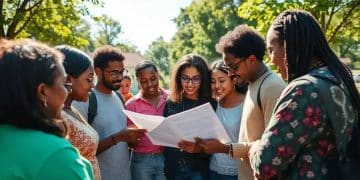Benefits of fairness in social impact signed of the millions

Achieving fairness involves addressing challenges like unconscious bias, socioeconomic inequality, and fostering community collaboration through education and ongoing discussions to promote an equitable society for all.
Benefits newly act fairness security impact social will BREAKING signed of the MILLIONS is a topic that highlights how fairness can reshape our society. Have you ever thought about how fairness influences your everyday life? Let’s dive into this crucial discussion.
Understanding the concept of fairness
Understanding the concept of fairness is essential for creating a just society. At its core, fairness means treating individuals in a manner that is free from bias and injustice. It encompasses various elements, such as equality and justice, and influences how people interact with each other.
Fairness can often seem like an abstract idea, but it has tangible effects on our lives. When people feel treated fairly, they are more likely to cooperate and support one another. This creates stronger communities filled with trust and collaboration.
Key Characteristics of Fairness
Several key characteristics help define fairness. These include:
- Equality: Treating everyone the same, regardless of their background.
- Justice: Ensuring that outcomes are just and accountable.
- Transparency: Making the rules clear for everyone involved.
These characteristics allow us to create environments where fairness thrives. It is also important to recognize that fairness is not the same as equality in all situations. For example, some individuals may require additional support to ensure they have the same opportunities as others.
Why Fairness Matters
Understanding why fairness matters requires a close look at its impact on society. When people perceive their environment as fair, they exhibit greater participation in community activities. This leads to:
- Improved wellbeing and mental health for individuals.
- Stronger relationships among community members.
- A more equitable distribution of resources.
Thus, the concept of fairness extends beyond interaction between individuals, affecting the entire community. In a society that values fairness, everyone can thrive.
The impact of fairness on social dynamics

The impact of fairness on social dynamics is profound and far-reaching. When communities prioritize fairness, they create environments where cooperation and trust can flourish. This fosters a sense of belonging among individuals, building stronger relationships.
In many cases, fairness can lead to a more engaged citizenry. When people believe that they are treated fairly, they are more likely to participate in community decisions, share their ideas, and work together towards common goals. This positive social interaction boosts community morale and encourages collaboration.
Key Effects of Fairness on Social Groups
Several key effects can emerge from a commitment to fairness in social dynamics:
- Enhanced cooperation: People are more willing to collaborate when they trust that everyone is treated equally.
- Reduced conflict: Fairness helps to minimize tensions between individuals and groups.
- Greater inclusivity: Ensures that everyone has a voice and an opportunity to contribute.
This interconnectedness strengthens social fabrics, making communities more resilient to challenges. As people feel valued and respected, they are encouraged to engage further, creating a cycle of positive reinforcement.
Measurement of Fairness in Society
The impact of fairness can often be measured by looking at social interactions and outcomes. For example, equitable access to resources leads to healthier, more vibrant communities. When fairness is present, people report higher satisfaction in both personal and community relationships.
Furthermore, the presence of fairness can affect areas such as education, employment, and justice. It sets a standard that influences policies and practices aimed at providing equal opportunities for all. In essence, the more we value fairness, the more just and equitable our society becomes.
Case studies of fairness initiatives
Case studies of fairness initiatives provide valuable insights into how equitable practices can be implemented in various contexts. These real-life examples show that prioritizing fairness can lead to positive outcomes in communities.
One notable case is the implementation of a community outreach program in a neighborhood aiming to improve access to education. Through workshops and mentorship opportunities, the initiative created a supportive environment where residents actively engaged in improving their children’s educational prospects. This case highlights how a focus on fairness can empower individuals and strengthen community ties.
Examples of Successful Fairness Initiatives
Several successful initiatives around the world demonstrate the impact of embracing fairness:
- The Fair Trade Movement: This initiative ensures that producers in developing countries receive fair compensation, allowing them to improve their living standards.
- Diversity and Inclusion Programs: These programs in workplaces focus on creating equal opportunities for all employees, promoting a culture of respect and understanding.
- Community Policing: Police departments adopting community policing strategies work collaboratively with residents to build trust and enhance public safety.
Each of these examples illustrates how embedding the principle of fairness into initiatives can lead to improved social cohesion. As we examine these cases, we can see patterns that reinforce the importance of equitable practices.
The Role of Evaluation in Fairness Initiatives
For initiatives to succeed, ongoing evaluation of their impact is crucial. Measuring outcomes helps identify challenges and areas for improvement. Initiatives focusing on fairness often shift their strategies based on community feedback, ensuring they remain relevant and effective.
Moreover, assessing the effectiveness of fairness initiatives can involve gathering qualitative data through interviews, surveys, and participant observations. This feedback loop creates greater accountability and allows initiatives to adapt to the unique needs of the communities they serve.
Challenges in achieving fairness

Challenges in achieving fairness are significant obstacles that many communities face. These challenges can stem from various sources, including systemic issues and individual biases. Understanding these barriers is vital for creating equitable practices in society.
One major challenge is the presence of unconscious bias. People often act based on their experiences and societal influences, which can lead to unfair decisions. This bias may affect hiring practices, education, and even law enforcement, often resulting in disparities in outcomes. Recognizing and addressing these biases is essential for progress.
Key Barriers to Fairness
Several factors contribute to the difficulties in achieving fairness:
- Socioeconomic Inequality: People from disadvantaged backgrounds often lack access to the same opportunities as others.
- Institutional Bias: Systems and organizations may have ingrained practices that unintentionally favor certain groups.
- Lack of Awareness: Many individuals are unaware of the implications of their actions on others, perpetuating unfairness.
These barriers create a complex landscape that challenges even the most well-intentioned efforts toward fairness. To overcome them, it is important for communities to engage in open discussions about these issues.
Strategies for Overcoming Challenges
To address the challenges in achieving fairness, several strategies can be implemented. Initiatives designed to educate individuals about biases can significantly reduce their impact. Workshops and training sessions can help raise awareness and develop empathy.
Furthermore, creating inclusive policies that actively promote equity can mitigate the effects of systemic inequality. This might include reforming hiring practices or promoting diversity within organizations. By fostering dialogue about fairness, organizations can create environments that challenge biases and encourage equality.
FAQ – Frequently Asked Questions About Fairness in Society
What are the main challenges in achieving fairness?
The main challenges include unconscious bias, socioeconomic inequality, and institutional practices that favor certain groups.
How can education promote fairness?
Education raises awareness about biases and equips individuals with the tools needed to address inequalities in society.
Why is community collaboration important for fairness?
Community collaboration fosters trust and encourages collective efforts to create a more equitable environment for all.
What role does continuous discussion play in promoting fairness?
Continuous discussion keeps the issues of fairness relevant, motivates action, and helps adapt strategies to meet community needs.





